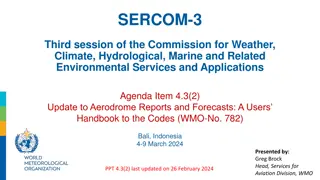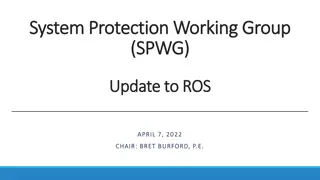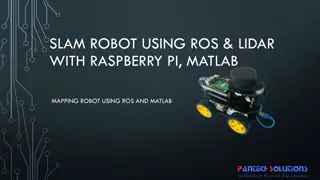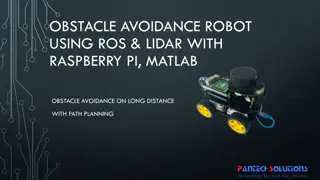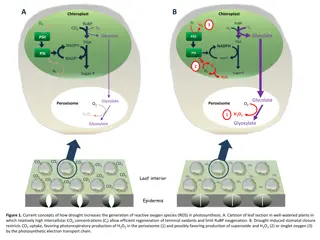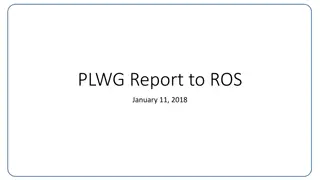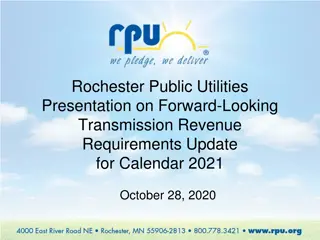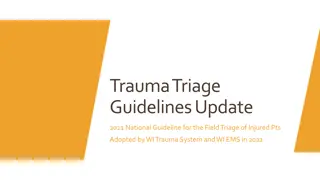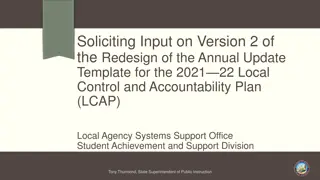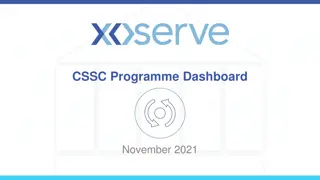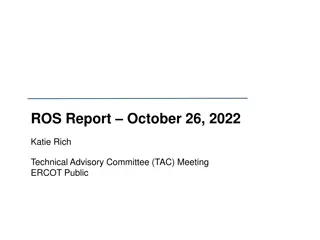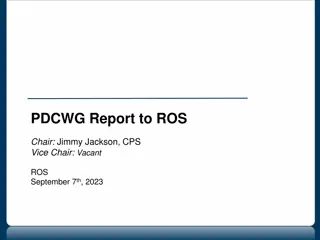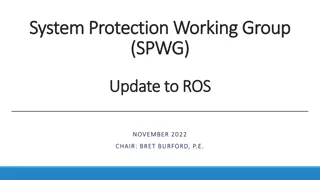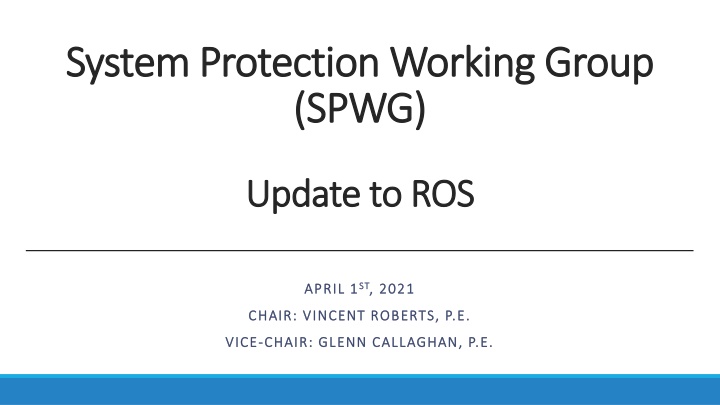
Analysis of Protection System Misoperations in Power Grids
Explore the data on protection system misoperations in power grids from 2012 to 2020, including types of misoperations, relay system types, equipment protected, and comparison of transmission outages and generation outages misoperation rates. Stay informed on the latest updates and discussions in the System Protection Working Group meetings.
Download Presentation

Please find below an Image/Link to download the presentation.
The content on the website is provided AS IS for your information and personal use only. It may not be sold, licensed, or shared on other websites without obtaining consent from the author. If you encounter any issues during the download, it is possible that the publisher has removed the file from their server.
You are allowed to download the files provided on this website for personal or commercial use, subject to the condition that they are used lawfully. All files are the property of their respective owners.
The content on the website is provided AS IS for your information and personal use only. It may not be sold, licensed, or shared on other websites without obtaining consent from the author.
E N D
Presentation Transcript
System Protection Working Group System Protection Working Group (SPWG) (SPWG) Update to ROS Update to ROS APRIL 1 APRIL 1ST ST, 2021 , 2021 CHAIR: VINCENT ROBERTS, P.E. CHAIR: VINCENT ROBERTS, P.E. VICE VICE- -CHAIR: GLENN CALLAGHAN, P.E. CHAIR: GLENN CALLAGHAN, P.E.
SPWG Meeting Overview SPWG Meeting Overview Meeting Held on March 2nd, 2021 Topics Discussed: 2020 Q4 Misoperation Data Potential Outreach to Generator Owners Revised SPWG Case Building Procedure Transformer Impedance Clarifications (RRGRR028) Next Meeting Scheduled for July 21st-22nd, 2021
Protection System Protection System Misoperations 2020 Q4 2020 Q4 Misoperations
Q4 2020 Protection System Misoperations 2020 # of Misoperations Total 32 115 345 kV 10 42 138 kV 21 70 < 100 kV 1 3 By Category Failure to Trip 1 3 Slow Trip 0 3 Unnecessary Trip during Fault 20 50 Unnecessary Trip Non Fault 11 59 SPS 0 0 By Relay System Type Electromechanical 0 5 Solid State 2 4 Microprocessor 25 87 Other/ N/A 5 19 By Equipment Protected Line 15 43 Transformer 3 14 Generator 5 18 Shunt/Series Capacitor 1 1 Shunt/Series Reactor 1 5 Dynamic VAR system 0 2 Bus 2 7 Breaker 4 19 Other 1 6
Comparison of TO and GO Misoperation Rate 25% TO Misop Rate GO/DP Misop Rate 20% 15% 10% 5% 0% 2015 2016 2017 2018 2019 2020
Protection System Misoperations 2020 Q4 Summary of Human Performance Issues noted for 2020 Q4: - 138kV breaker failure misoperated due to an incorrect logic setting - 138kV line misoperated during a fault due to an incorrect undervoltage element setting - 345kV line terminal misoperated due to an incorrect ground direction control setting - 138kV line terminal misoperated due to incorrect settings. Settings were not updated after a new substation was cut-in on the line - 345kV auto transformer tripped due to incorrect CT ratios - 138kV line terminal misoperated due to incorrect ground distance settings - 138kV line terminal misoperated due to incorrect CT wiring Failure to Trip/Slow Trip Misoperations in 2020 Q4: - Generator breaker failed to trip due to a bad trip coil
Definitions Protection System Protective relays which respond to electrical quantities, Communications systems necessary for correct operation of protective functions Voltage and current sensing devices providing inputs to protective relays, Station dc supply associated with protective functions (including station batteries, battery chargers, and non-battery-based dc supply), and Control circuitry associated with protective functions through the trip coil(s) of the circuit breakers or other interrupting devices
Definitions Composite Protection System - The total complement of Protection System(s) that function collectively to protect an Element. Backup protection provided by a different Element s Protection System(s) is excluded. Misoperation The failure a Composite Protection System to operate as intended for protection purposes. Any of the following is a Misoperation: 1. Failure to Trip During Fault A failure of a Composite Protection system to operate for a Fault condition for which it is designed. 2. Failure to Trip Other than Fault - A failure of a Composite Protection system to operate for a non-Fault condition for which it is designed, such as a power swing, undervoltage, overexcitation, or loss of excitation.
Definitions Misoperation The failure a Composite Protection System to operate as intended for protection purposes. Any of the following is a Misoperation: 3. Slow Trip During Fault A Composite Protection system that is slower than required for a Fault condition if the duration of its operating time resulted in the operation of at least one other Element s Composite Protection System. 4. Slow Trip Other than Fault - A Composite Protection system that is slower than required for a non-Fault condition, such as a power swing, undervoltage, overexcitation, or loss of excitation, if the duration of its operating time resulted in the operation of at least one other Element s Composite Protection System.
Definitions Misoperation The failure a Composite Protection System to operate as intended for protection purposes. Any of the following is a Misoperation: 5. Unnecessary Trip During Fault An unnecessary Composite Protection system operation for a Fault condition on another Element. 6. Unnecessary Trip Other than Fault - An unnecessary Composite Protection system operation for a non-Fault condition. A Composite Protection System operation that is caused by personnel during on-site maintenance, testing, inspection, construction, or commissioning activities is not a Misoperation.
Outreach to Generators Outreach to Generators TRE provides misoperation data to SPWG during each meeting. Trends are reviewed to detect any areas of concern that may warrant further discussion Misoperations rates for GO s continue to trend upwards while misoperation rates on the transmission system have declined. SPWG requests input from ROS on potential methods for reaching out to GO s to address the number of misoperations. Comparison of TO and GO Misoperation Rate 25% TO Misop Rate GO/DP Misop Rate 20% 15% 10% 5% 0% 2015 2016 2017 2018 2019 2020
Transformer Impedance Clarifications (RRGRR028) Transformer Impedance Clarifications (RRGRR028) SPWG completed a workshop in August 2020 to discuss the impact of IBRs on ERCOT Grid Protection and review the results of an IBR survey that was sent out to SPWG members One finding during the discussion was a need for improved transformer data in models, specifically three-winding transformer information. John Karlik, on behalf of SPWG, submitted RRGRR028 and this was posted on December 23rd, 2020. The RRGRR proposed changes and additions to the Resource Registration Glossary to increase data transparency and improve the overall modeling process.
Transformer Impedance Clarifications (RRGRR028) Transformer Impedance Clarifications (RRGRR028) SPWG members met with Jay Teixeira in late January 2021 to discuss the proposed changes and solicit ERCOT feedback on the best approach Additional changes to RRGRR028 were completed in early March 2021 in accordance with the ERCOT discussion in January and to account for baseline updates following the March 1st, 2021 incorporation of RRGRR027. ERCOT to complete the Impact Analysis for RRGRR028 and submit for ROS review following this presentation.
End of SPWG Presentation End of SPWG Presentation Next Meeting Scheduled for July 21st-22nd, 2021 ERCOT ROS Update will be Provided on August 5th, 2021 Thank You Any Questions?

